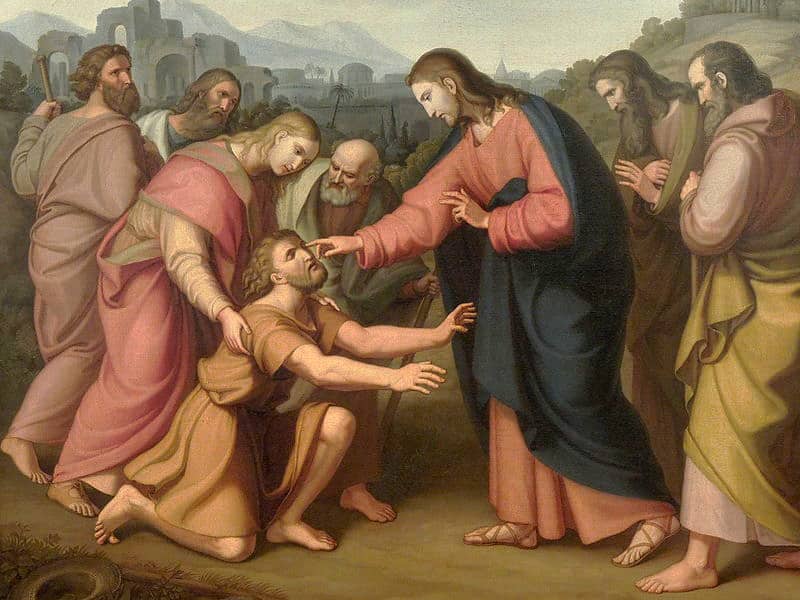This Sunday, the Church comes to the middle of Lent. She marks the occasion by calling for a small pre-Easter celebration of joy. Today is called Laetare Sunday in Latin, with the word laetare meaning “rejoice.” And so, today is “Rejoice Sunday.”
Are we rejoicing? What are we supposed to be rejoicing about?
The entire Lenten season points us to celebrating and re-living the Paschal Mystery, namely, the passion, death, and resurrection of Jesus Christ. In order for us to live this mystery, we must cooperate with grace and let it draw us closer and closer to the Lord. The spiritual tradition of the Church calls this the purgative way.
We can see an example of the purgative way in the blind man in today’s Gospel reading. The man goes from calling the Lord “the man called Jesus,” to “a prophet,” to recognizing him as “the Son of Man.”
As with the blind man, so with each of us. The Lord wants to draw us close to him. For this to happen, we must accept the purgative way.
The purgative way is an interior purification of our souls. It is a divine “cleaning up” and maturing of our hearts to the supernatural life offered to us in Jesus Christ.
Saint Paul expresses this reality, when he writes: “I have been crucified with Christ; yet I live, no longer I, but Christ lives in me; insofar as I now live in the flesh, I live by faith in the Son of God who has loved me and given himself up for me.”
The purgative way has a time of consolation, but it quickly passes into a time of desolation. As we enter the desolation, our souls feel a spiritual darkness. Everything we thought we knew is turned upside down. It can be abrupt and cause emotional confusion. There is silence. The souls feels alone. It is restless. The soul, however, is strengthened to persevere and remain faithful to the work the Lord is doing.
In the darkness of the purgative way, God reorients the soul. Our feelings, which usually want to follow our passions, are spiritualized and channeled to a deeper love of God and neighbor.
Since grace belongs to the supernatural order, it escapes our experience and can only be known by faith. We cannot rely on our feelings during the purgative way.
While our feelings may not experience it, God is close to us in the purgative way. He can bring about a great work in our souls if we allow him. It is very important that we realize the place and purpose of the purgative way. There is a goal. The spiritual suffering leads us to a greater freedom and to a deeper relationship with God.
Many times those in the purgative way can falsely think that they have done something wrong, or God is angry with or punishing them. None of this is true. God is purifying and elevating the soul to know and love him more.
In the purgative way, we must permit a harrowing of our faith. While first given to us as a supernatural gift in baptism, we are called to fan our faith into a flame. The flame can only grow through the purgative way.
As with the blind man in our Gospel today, the purgative way can involve misunderstanding, rejection, internal confusion, and frustration.
Through the process of purgation, we must cling to the sure conviction that God is with us, he loves us, and desires for us to know him in a more profound way. He wants us to experience and re-live the Paschal Mystery. As the Lord Jesus underwent the Paschal Mystery, so each of us as “sons in the Son” are called to do the same. We must follow where the Lord Jesus, our savior and older brother, has gone.
There is no spiritual growth without the purgative way. There is no path to go from seeing the Lord Jesus as a man, to a prophet, to the Son of Man without spiritual purification. If we are going to truly know Jesus Christ, the Crucified and Risen One, then misconceptions must be dismissed, false images must be reformed, and love must be intensified. Such a work only happens through the school of suffering. Such depth can only be given through the Paschal Mystery.
As we rejoice this Sunday, we are called to welcome the purgative way, so that when Holy Week comes, we’ll be ready to liturgically celebrate the Paschal Mystery that we are actively living in our own lives.














